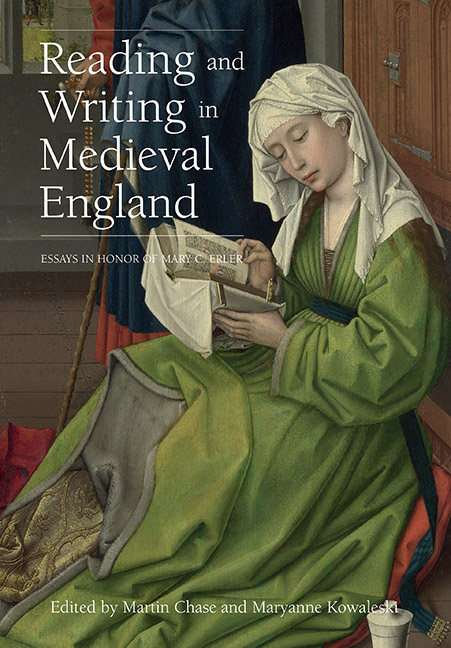Book contents
- Frontmatter
- Contents
- List of Illustrations
- List of Contributors
- List of Abbreviations
- Introduction: Bibliography in the Service of Biography
- “Withinne a Paved Parlour”: Criseyde and Domestic Reading in a City under Siege
- Beatrice Melreth: A London Gentlewoman and her Books
- How Intellectual Were Fifteenth-Century Londoners? Grammar versus Logic in the Citizens’ Encounters with Learned Men
- Social Memory, Literacy, and Piety in Fifteenth-Century Proofs of Age
- Crafting the Old Testament in the Queen Mary Psalter
- Affective Reading and Walter Hilton's Scale of Perfection at Syon
- Book Accessories, Gender, and the Staging of Reading
- Enska Vísan: Sir Orfeo in Iceland?
- Reading the Real Housewives of John Foxe's Book of Martyrs
- The Writings of Mary Carpenter Erler
- Index
- Tabula Gratulatoria
Book Accessories, Gender, and the Staging of Reading
Published online by Cambridge University Press: 21 June 2019
- Frontmatter
- Contents
- List of Illustrations
- List of Contributors
- List of Abbreviations
- Introduction: Bibliography in the Service of Biography
- “Withinne a Paved Parlour”: Criseyde and Domestic Reading in a City under Siege
- Beatrice Melreth: A London Gentlewoman and her Books
- How Intellectual Were Fifteenth-Century Londoners? Grammar versus Logic in the Citizens’ Encounters with Learned Men
- Social Memory, Literacy, and Piety in Fifteenth-Century Proofs of Age
- Crafting the Old Testament in the Queen Mary Psalter
- Affective Reading and Walter Hilton's Scale of Perfection at Syon
- Book Accessories, Gender, and the Staging of Reading
- Enska Vísan: Sir Orfeo in Iceland?
- Reading the Real Housewives of John Foxe's Book of Martyrs
- The Writings of Mary Carpenter Erler
- Index
- Tabula Gratulatoria
Summary
In recent decades, reading communities have garnered much interest among medievalists, foremost among whom is Mary Erler, whose focus on women's reading communities drew me to work with her. One of my most vivid memories after my arrival at Fordham as a graduate student involves an occasion on which we met to discuss my academic plans and interests. I was then in the early stages of a project involving the materiality of medieval bookmarks; Mary asked about how they were described, and I offered several of the terms I had found in inventories and wills, one of which was “register.” Mary immediately offered me a copy of her essay on the sacristan's rolls from Syon, pointing me to the account records with which she had worked that mentioned register bookmarks. To be able to discuss how my work intersected with that of another scholar was both an exciting and encouraging experience. In this essay, I am delighted to return to this intersection of shared interests to further explore the care for books, reading practices, and gender, beginning in Mary's stomping ground of Syon.
Reinvigorated by interest in the manuscript as a locus of analysis, heightened by awareness of and research into overlooked communities of readers, and facilitated by attention to the diversity of literacy practices in late medieval England, the study of medieval readers and their books has developed into a flourishing subject of study. Women's reading communities, devotional reading practices, the work of manuscript glosses, scribal corrections, and more have drawn attention to the myriad social and cultural influences that shaped reading and interaction with books in the Middle Ages. Absent from this discussion, however, and strikingly absent given the material turn pursued by medieval studies in recent years, has been assessment of how peripheral objects related to books shaped their use and reading. Book furniture, including desks, lecterns, and prie-dieux, and accessories such as bookmarks, have received little or no attention. The ubiquity of these objects that accompanied and accessorized books perhaps explains some of the ease with which it has been possible to overlook them; the ease with which these objects can be separated and viewed as separable from books surely contributes further. Yet examining such book furniture and accessories reveals differences in representations of medieval readers’ interactions with books.
- Type
- Chapter
- Information
- Reading and Writing in Medieval EnglandEssays in Honor of Mary C. Erler, pp. 150 - 177Publisher: Boydell & BrewerPrint publication year: 2019



